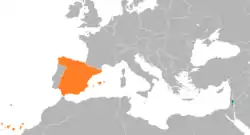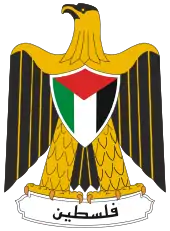Palestine–Spain relations
Palestine–Spain relations are the bilateral and diplomatic relations between these two countries. Palestine has an embassy in Madrid.[1] Spain has a consulate general in East Jerusalem that serves the Palestinian delegation.[2]
 | |
Palestine |
Spain |
|---|---|
Diplomatic relations
Diplomatic relations between Spain and the Palestinian Authority can be described as excellent. Good relations with Israel and the ANP were decisive when choosing Madrid as the venue for the 1991 Peace Conference that would open the peace talks between Palestinians and Israelis.[3]
The numerous visits to Spain of the top Palestinian leaders are proof of the good state of diplomatic relations between the two countries. Yaser Arafat in the past and Mahmoud Abbas have now visited Madrid with an at least annual rate and have also received the Spanish authorities in Ramallah and Gaza in repeated occasions. Presidents Aznar and Zapatero visited Ramallah in 1999 and 2009 respectively. In April 2011, it was the Princes of Asturias who were officially received at the Muqata’a Presidential Complex in Ramallah by President Abbas.[3]
The work of the Spanish Cooperation in the last decade in the Palestinian Territories is also proof of the excellent relations between Spain and the Palestinian Territories In this sense, the Spanish and Palestinian civil societies maintain intense contacts through the presence of Spanish cooperators who develop his work in the Palestinian Territories as well as through the numerous Palestinian citizens who have been beneficiaries of the Spanish Cooperation scholarship system and who have established intense contacts during their academic stays in Spain.[3]
Economic relations
The trade balance is always favorable for Spain, although merchandise traffic between the two countries is insignificant. From the analysis of the Spanish export figures, always with the qualifications indicated, the following data stand out: The total is historically insignificant in absolute terms. Exports to Palestine are directly linked to shipments that were financed with FAD credits. The slowdown in the execution of FAD projects since 2000 has been responsible for the fall in the total value of Spanish exports to the Palestinian Territories; €9 million in 1999, €6 million in 2005, €1.6 million in 2006, and the same figure in 2007. During 2009 and 2010 the figures have been very small (€0.90 and €3.72) respectively. In 2012, Spanish exports amounted to 7 million euros. Imports by Spain of Palestinian products are almost non-existent; In fact, in the last three years and until October 2013 there have been no purchases by Spain.[4]
Cooperation
The overall objective of the Spanish Cooperation with the TTPP is the creation of a viable Palestinian State, mainly through the fight against poverty (economic and social development), the strengthening of State structures and institutions and the support to society civil in the field of democratic values and peace building.[5]
The commitment of the Spanish people to the Palestinian people has been constant, and began in 1994 in Tunisia, with the signing of the “Memorandum of Understanding concerning the Hispano-Palestine Cooperation ”, this commitment renewed and consolidated by virtue of the five Mixed Commissions signed to date. This commitment to the Palestinian people has materialized in recent years in a very significant increase in official development aid that has gone from 31 million euros in 2005 to 53 million euros in 2011 of total net ODA, thus becoming Spain in the second largest donor in the European Union to the TT.PP.[5]
The V Meeting of the Joint Hispanic-Palestinian Commission for Cultural, Educational, Scientific and Technical Cooperation, held in Madrid in January 2008, highlighted the Spanish commitment to a just and peaceful solution to the conflict under International Law, as well as the creation of a sovereign and independent Palestinian State, with recognized borders, which coexists in peace and security with Israel, in accordance with the United Nations Resolutions, the Madrid Peace Conference (1991) and the Arab Peace Initiative (2002). The aforementioned V Mixed Commission, included as priority areas of action "Basic Services", "Agriculture" and "Culture for Development", highlighting as strategic lines of action, the sectors "Governance" and the Support to Civil Society in matters of "Peace Building". These priority areas of action make up the current Spanish Cooperation program in TTPP. Spain also supports Palestinian refugees through the UNRWA (United Nations Agency for Palestinian Refugees), which provides basic education, health and social protection services to Palestinian refugees in Gaza, the West Bank, Lebanon, Syria and Jordan.[5]
In 2012 and 2013, Official Development Assistance for TT.PP. has reached 16 and 7.9 million euros, respectively, in a context of budget cuts, and compliance with the deficit targets set by the Government. In 2014 the VI Palestine Hispanic Mixed Commission will be signed, coinciding with the culmination of the process of identification and drafting of the Spanish Cooperation Association Framework with TTPP (2014-2017). The Partnership Framework will continue and deepen the development of public institutions, good governance, peace and security, gender equity as well as social development and Palestinian economic stability, all in order to revalidate our commitment to the establishment of an independent and democratic Palestinian State.[5]
References
- Embassy of Palestine in Madrid.
- Ficha de Palestina Archived 2014-12-02 at the Wayback Machine Office of Diplomatic Information. Ministry of Foreign Affairs and Cooperation. Section: Representation Data.
- Ficha de Palestina Archived 2014-12-02 at the Wayback Machine Office of Diplomatic Information. Ministry of Foreign Affairs and Cooperation. Section: Diplomatic relations.
- Ficha de Palestina Archived 2014-12-02 at the Wayback Machine Office of Diplomatic Information. Ministry of Foreign Affairs and Cooperation. Section: Economic relations.
- Ficha de Palestina Archived 2014-12-02 at the Wayback Machine Office of Diplomatic Information. Ministry of Foreign Affairs and Cooperation. Section: Cooperation.

.svg.png.webp)